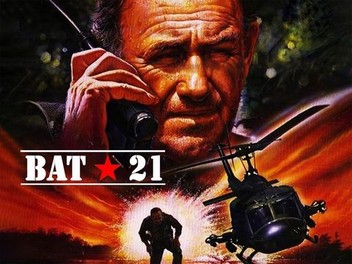meatthesavages.com – “Bat*21” is a 1988 American war drama film that offers a gripping portrayal of survival and rescue during the Vietnam War. Directed by Peter Markle, the film is based on the true story of Lieutenant Colonel Iceal “Gene” Hambleton’s harrowing experience behind enemy lines. The movie adapts the book “Bat 21” by William C. Anderson, providing an intense narrative that explores themes of courage, strategy, and the human spirit amidst warfare.
Plot Overview
Set during the Vietnam War, “Bat*21” centers around the mission to rescue Lieutenant Colonel Hambleton, played by Gene Hackman, after his aircraft is shot down in enemy territory. The film begins with Hambleton’s EB-66 electronic warfare plane being targeted and destroyed by North Vietnamese forces. As the sole survivor, he is left to navigate the hostile environment with limited resources. His only lifeline is his radio, through which he communicates with Captain Bartholomew Clark, portrayed by Danny Glover, who is determined to orchestrate a daring rescue mission.
Themes and Characters
The film delves into the psychological and physical challenges faced by Hambleton as he struggles to stay alive while evading enemy troops. His interactions with Captain Clark provide a powerful depiction of camaraderie and resilience. Hackman’s portrayal of Hambleton captures the vulnerability and determination of a man fighting against time and overwhelming odds. Meanwhile, Glover’s character represents the strategic and moral complexities of warfare, emphasizing the cost of human life and the courage required to save it.
Direction and Cinematography
Peter Markle’s direction ensures that “Bat*21” maintains a palpable tension throughout, with authentic depictions of war-torn landscapes and the constant threat of danger. The cinematography captures the dense jungles and the perilous conditions that Hambleton must endure, enhancing the sense of isolation and urgency. The film’s dedication to realism is further supported by its on-location shooting in Malaysia, which adds to the authenticity of the setting.
Critical Reception and Impact
Upon its release, “Bat21″ received praise for its performances, particularly those of Hackman and Glover. Critics highlighted the film’s ability to convey the emotional and physical toll of war, while also appreciating its focus on the human elements of survival and sacrifice. While not a conventional war film filled with large-scale battles, “Bat21″ resonates through its intimate storytelling and character-driven narrative.
Conclusion
“Bat21″ stands as a testament to the enduring spirit of those who face insurmountable challenges in times of conflict. By focusing on a single, true story of survival, the film offers a unique perspective on the Vietnam War, emphasizing the bravery and ingenuity required to overcome the odds. Whether viewed as a historical drama or a captivating tale of human endurance, “Bat21″ remains a significant contribution to the genre of war cinema.

